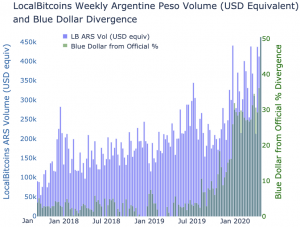Bitcoin Is Not Just a Dollar Gateway in Argentina

Bitcoin (BTC)’s usage in Argentina may not be connected with a desire to buy fiats like the United States dollar, says an industry expert, who says that Argentinians could well have more nuanced reasons for snapping up vast quantities of the world’s favorite cryptocurrency in recent weeks.
As reported last month, after trading volumes rose on peer-to-peer (P2P) platform LocalBitcoins, Open Money Initiative contributor Matt Ahlborg claimed that for most Venezuelans, bitcoin was being used as a “gateway,” and is primarily traded by the nation’s large ethnic Chinese community.
But Ahlborg says that although Argentina has also seen elevated BTC trading volume on LocalBitcoins, dollar dreams are not inspiring the nation’s most recent bitcoin rush.
In a blog post, Ahlborg opines that while Venezuelans “typically purchase bitcoin with bolivars in order to immediately turn around and trade them away for dollars held in offshore accounts,” this is not the case in Argentina. He writes,
“In Argentina, there already exists an extensive informal infrastructure to obtain dollars through the cueva networks. Consequently, bitcoin is needed a lot less.”
Cuevas, which means caves in Spanish, are illegal bureau de change outlets that can be found in most major city centers, particularly in the capital Buenos Aires. Citizens often use these to buy USD, euro and other international fiats.

Instead, Ahlborg believes that Argentinians may instead be using BTC as a speculative tool. He also theorizes that Venezuelan migrant workers in Argentina might be responsible for driving up bitcoin volumes.
And a third reason, and perhaps the biggest, behind the rise of BTC in Argentina, he says, are “problems endemic to Argentina,” such as “the reintroduction of capital controls.”
Argentina’s financial crisis continues to deepen, with international creditors earlier this month reject a debt offer, per the Financial Times. The nation has defaulted on loans worth over USD 500 million, and high inflation has dogged the country’s fiat peso for several months.
Ahlborg concludes that bitcoin’s fate in Argentina will depend on whether the government decides to crackdown on cuevas, and whether Buenos Aires decides to “lay on new capital controls or back off and let free markets reign.”











Responses